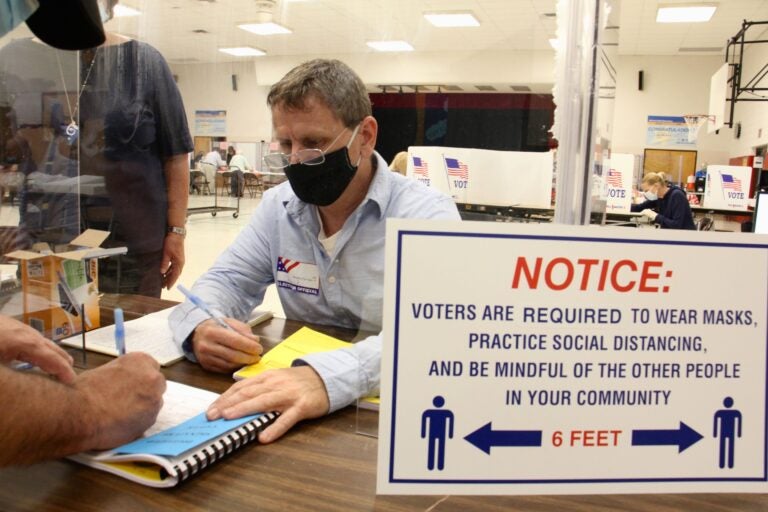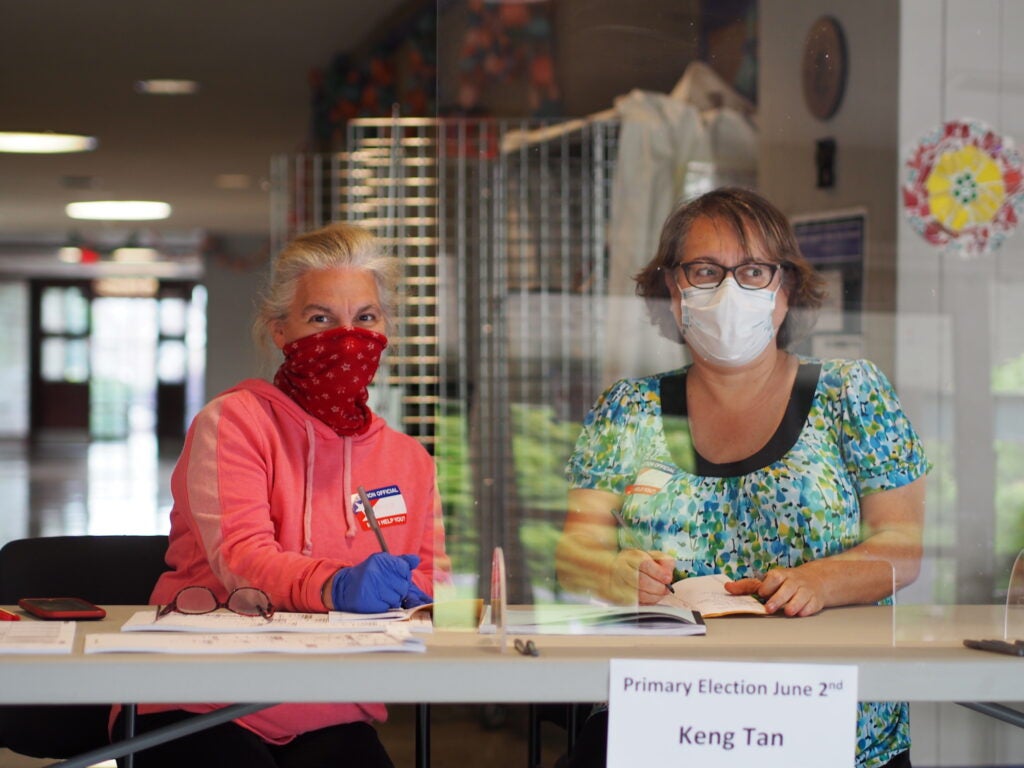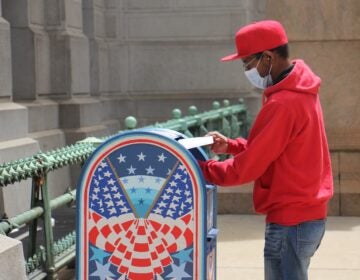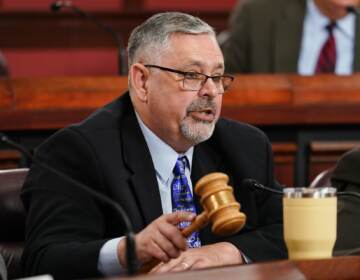Polls close in unprecedented Pa. primary
The primary was delayed because of COVID-19 and many voters chose to cast a ballot by mail instead.

Poll worker Chuck Kellander interacts with voters through a plexiglass screen at Belmont Hill Elementary School in Bensalem, Bucks County. (Emma Lee/WHYY)
A primary day unlike any other has come to a close in Pennsylvania.
Per usual, polls closed at 8 p.m. on Tuesday night — but anyone in line before then will still get to vote. City officials instituted an 8:30 p.m. curfew in Philadelphia, and have said they won’t be arresting people heading home from the polls.
Not counting the global pandemic and the thousands of people protesting police brutality daily — which inspired an 8:30 p.m. curfew in Philadelphia — this year’s Pa. primary election is also the state’s first foray into offering mail-in ballots to everyone.
It hasn’t gone without any hiccups.
Gov. Tom Wolf granted mail-in extensions to six counties on Monday, acknowledging that voters might struggle to turn in their ballots amid widespread protests. By the evening on primary day, a judge granted Bucks County voters an extension, too — bringing the total to seven counties. A judge in Delaware County made a similar call, adding an extra layer of legal justification to Wolf’s order.
Speaking of Bucks County: Election officials there say voters are having trouble fitting their paper ballots into scanners.
It’s too early to say what turnout looks like in the southeastern Pennsylvania region. Poll workers are reporting long lines in some places, while others stand alone in virtually empty polling places.
For now, it’s unclear if the crowds are due to the consolidation of polling places made necessary by coronavirus, or if drops in turnout can be attributed to widespread use of mail-in ballots.
Out in the suburbs outside Philly, at Drexel Hill Middle School in Upper Darby, elex works say it’s been slow today, suspect bc of mail in ballots. No lines. But lots of complaints of poor coordination getting systems, volunteers, PPE in place. pic.twitter.com/doyb0YG2s1
— Zachariah Hughes (@ZachHughesNews) June 2, 2020
This Doylestown ballot box is seeing a STEADY stream of people. I spoke to one couple who applied on the deadline and just got their ballots yesterday. They drove a half hour to this ballot box, and just found out that thanks to the court order, they could have mailed it. pic.twitter.com/F6ZhL5rZHV
— Katie Meyer (@katieemeyer4) June 2, 2020
Next stop in the Montco tour is Stewart Middle School in Norristown. This site only added one precinct to its usual two. One potential side effect of the pandemic: less info for voters. Steven Williams (R) said he didn’t see much candidate lit going around pic.twitter.com/owfijLCpMs
— Ximena Conde (@RadioXimena) June 2, 2020
Long lines as Philly’s curfew nears
In the final hours before polls closed, hundreds of people were still waiting to vote in four separate lines at the Samuel Powel School in West Philly.
Exhausted poll workers struggled to keep up. The wait got so long that elderly residents had trouble standing the entire time — and some younger voters let them cut the line.
Mantua resident Tanya Heath said she waited in line for an hour to vote. The mood was tense.
“It was almost expected, because it’s after 5 o’clock, when the working crowd gets off and everybody rushes to vote,” said Heath, 31. “But this time, with the uncertainty of the threat of this curfew, people were near panicked.”
Despite the anxiety in the air, Heath said she felt mostly comfortable at her polling place. Almost everyone wore a mask and kept their distance, and there weren’t any protests in the immediate area.
“It’s the pleasure of showing up and knowing that, especially with the new machines we have in Philadelphia, knowing that what you’re clicking is real,” she said. “It’s the power. You get the sense of relief, or at least I do.”
After problems with roll out, slow vote pace in Upper Darby
By the early afternoon at the Drexel Hill Middle School in Upper Darby, election workers in one of the consolidated precincts had only seen about three dozen voters.
“I think because they voted in advance,” said Eva Marie Shahade.
She and her sister, Anissa Hill, were sitting behind a plexiglass barrier at a folding table in the school’s hallway, helping guide voters through a process that has undergone a number of changes, causing some confusion for voters, poll workers, and organizers.

“We were waiting this morning for the important people to show up,” Shahade said. “We found out this morning around 7 o’clock that we were the important people and we needed to know what we were doing.”
“There was a lot of miscommunication in the beginning,” she added.
Some of that has to do with polling locations consolidated because of concerns over the coronavirus, moving typical sites into public buildings.
“We’ve had to constantly go on our phone to help them,” Hill said, explaining how workers have tried to guide primary voters to the correct location, which may be as close as the nearby gymnasium.
Even though it was his first year voting at the site, for resident Joseph Artmont it went off without a hitch.
“Very easy experience,” he said.
Although he himself had no concerns over the coronavirus, he thinks that, as well as the proliferation of mail-in ballots, explain the low turnout so far.
“I think it was half and half, I think people were scared to come out, I think people did more mail-in ballots,” he said.
For his part, Artmont said he prefers the civic ritual of voting in person.
“I like coming to polls. It’s a tradition since the first time I voted with my parents,” he said.
Election organizers here in Delaware County are hoping that a range of problems rolling out this year’s primary election will not affect voters’ abilities to cast a ballot, and will serve as an important lesson heading into November’s general election.
“These are serious, difficult problems to solve in a hurry, and we have a lot of them,” said Scott Alberts, Vice-Chair of the Upper Darby Democrats.
The issues, he said, are “manifold.” Voting equipment was procured by the county’s previous administration, but implemented under the new one. There are new protocols for handling ballots. Furloughs of county staff and the inability to meet in person planning this year’s primary because of coronavirus made preparing more difficult. Some supplies of personal protective equipment did not arrive for volunteers. And now, the other thing, too.
“We have a civil unrest situation,” said Alberts, who lives not far from businesses that were looted earlier in the week. “I’m going to polling places passing national guard trucks. It’s all very tense, we’re all very emotional.”
He hopes that election and party officials can partake in a public, transparent process to eliminate flaws experienced this time around.
“There’s a lot of blame to go around,” he said. But then quickly added, “It’s important how we fix it.”
In Bucks County, ballot issues and an emergency petition
Bucks County poll workers have had to contend with two issues in today’s primary. The first: They’re using machines that require voters to feed their paper ballots into scanners — but some of the ballots are too big.
The other problem affected even more voters. Bucks officials say that due largely to mail delays caused by the pandemic, voters who applied for mail-in ballots on time still weren’t able to postmark them in time to be counted on election day.
That’s what happened to Patty Vicino and Charlie Johnsrud, a couple who applied for mail-in ballots on the deadline, but just got them yesterday. On Tuesday, they drove a half hour to hand their ballots in at a drop box at the county elections office in Doylestown.
“It’s unrealistic to have a deadline of a week before to get it, and then to rely on the post office to get it back,” Vicino said.
County commissioners filed an emergency petition late last week to extend the deadline for ballots to be received. And for the better part of primary day, they waited for a last-minute verdict from Common Pleas Judge James McMaster.
Late Tuesday afternoon, he granted the extension.
Under the new ruling, election officials will be permitted to accept ballots that arrive by June 9, so long as they were postmarked by Monday, June 1.
The order differs slightly from one Gov. Tom Wolf put in place on Monday in six counties — Philadelphia, Delaware, Montgomery, Erie, Allegheny and Dauphin. They have an extra week to count ballots, so long as they’re postmarked by Tuesday.
County Solicitor Joe Kahn, who on Tuesday evening was busy writing up the new order, said the county’s appeal for an extension was due to the pandemic, not civil unrest, as it was in the other counties.
He said they had pushed for a Monday postmark deadline in an effort to correct the system for voters who could have reasonably expected to be able to mail their ballots by the deadline.
“We realized that voters in Bucks County who had followed the law and done nothing wrong were at risk of having their constitutional rights denied,” he said.
He added that as of Tuesday morning, the county was still waiting for more than one-third of its mail-in ballots to be returned. Larry King, a county spokesman, said around 102,000 have been requested, and only about 71,000 have made it to the county elections office — though many more had likely been handed in at drop boxes.
There’s one lingering caveat to Bucks’ extension: McMaster requested county officials count the ballots that arrive after 8 p.m. today separately, just in case there’s an appeal in the coming days.
Of the ballots that were too big for the scanners, King said the issue has been sporadic at polling places across the county, and has affected ballots for both parties.
He said county officials believe the issue is the fault of the vendor in charge of printing the ballots, Reliance Graphics. They’ve instructed election judges to trim the ballots with scissors if necessary.
“The paper, I think there’s a little difference in the way that it’s been made, a slight difference in construction of it, so it’s a little tighter fit,” said Linda Wood, an election judge who works at a Bensalem district.
At a polling place in Langhorne Borough, elections officials said the ballots only work with one of the two scanners they have, but since turnout has been so low, using only one has not caused delays.
One protest encroached on a polling place
A spokesperson for the Philadelphia City Commissioners said the office knew of one protest near a polling place on Tuesday night.
For the second night in a row, people protesting police brutality in Fishtown were met with counter-protestors who purported they were there to “protect police.” The two groups met on primary night at Girard and Montgomery avenues — just outside the Fishtown Recreation Center polling place serving the 18th Ward.
An hour before polls closed, the Commissioners’ office said the protest hadn’t impacted polling place operations.
A very mixed group of protesters is down at Girard and Montgomery in Fishtown today. Across the street is a group of mostly white counter protesters. This comes after groups of mostly white men attacked a @WHYYNews producer last night. pic.twitter.com/3wuBr75lkO
— Layla Jones (@bae_lay) June 2, 2020
Even with ballot extensions, some voters fall through cracks
Despite Wolf’s order extending their mail-in deadline due to civil unrest, Delaware County officials still pursued a standing petition that asked a judge to give them more time to receive mail-in ballots.
As in Bucks, they got the verdict today: DelCo voters would have until Tuesday evening to postmark ballots. According to the Philadelphia Inquirer, the extra time would also allow the county to send between 400 and 500 ballots it previously said it wouldn’t send, as they wouldn’t have gotten to voters in time.
But the extension won’t help Konstantinos Davidos vote.
Davidos will turn 91 in a few days, and uses a walker. He and his daughter, Georgia Davidos, both live in Delaware County. She applied for absentee ballots for them both in mid-April.
Davidos said she checked the status of the ballots in mid-May and saw they’d been sent out, but by the time primary day rolled around they still hadn’t arrived.
Davidos decided to risk COVID-19 and cast a provisional ballot in person, but she and her dad decided he wouldn’t join her.
“My dad has health issues,” she said. “We didn’t think it was a good idea for him to go and vote. If it had been November, it would have been a much harder decision.”
Her father, she said, is a Greek immigrant who gained citizenship in the 1960s and has voted “in every election for the past I don’t know how many years.”
“He understands the privilege of voting,” she said. “It was tough for him not to vote today. But these days voting is a life or death thing.”
Davidos said she’s already thinking forward to the general election. If there’s another wave of coronavirus, she wants to be confident she’ll be able to vote by mail.
“My hope is that no one will have to make a decision of whether to vote or get sick,” she said.

Your go-to election coverage
In Bucks County, ballot issues and an emergency petition
Bucks County poll workers have had to contend with two issues in today’s primary. The first: They’re using machines that require voters to feed their paper ballots into scanners — but some of the ballots are too big.
“The paper, I think there’s a little difference in the way that it’s been made, a slight difference in construction of it, so it’s a little tighter fit,” said Linda Wood, an election judge who works at a Bensalem district.
County spokesperson Larry King said that commissioners don’t yet know the scale of the problem, but they’ve seen sporadic issues at polling places across the county that have affected ballots for both parties.
King said county officials believe the issue is the fault of the vendor in charge of printing the ballots, Reliance Graphics. They’ve instructed election judges to trim the ballots with scissors if necessary.
At a polling place in Langhorne Borough, elections officials said the ballots only work with one of the two scanners they have, but since turnout has been so low, using only one has not caused delays.
And for the better part of the day, Bucks County officials were also waiting on a last-minute bid to get voters more time to submit their mail-in ballots. Gov. Tom Wolf declared on Monday that six counties — Philadelphia, Delaware, Montgomery, Erie, Allegheny and Dauphin — have an extra week to count ballots, so long as they’re postmarked by Tuesday.
That order didn’t extend to Bucks County — that is, until Tuesday evening, when Judge James McMaster granted the county’s emergency petition to extend its deadline. Under the new ruling, election officials will be permitted to accept ballots that arrive by June 9, so long as they were postmarked by Monday, June 1.
That differs slightly from other counties that received extensions, where ballots can be counted if they were postmarked by Tuesday.
“We were trying to be true to the spirit of the law that it had to be mailed before Election Day,” King said.
There’s just one lingering caveat: McMaster requested county officials count the ballots that arrive after 8 p.m. today separately, just in case there’s an appeal in the coming days.
A manageable pace in Norristown
The Stewart Middle School polling place in Norristown usually welcomes two precincts. This time around, it squeezed in one more, which poll workers say they found manageable.
By 4:45 p.m., elections judge Christine Hill said the two precincts typically assigned to the school had clocked roughly 150 voters each — keeping pace with previous presidential primaries.
Still, there was one potential pandemic side effect: Less available information for voters. Steven Williams said he didn’t see as much candidate literature going around.
“Usually they drop the leaflets by the house, you get to read it, somebody comes to the door,” said Williams, who lives in the state Senate’s 17th district. “Didn’t happen this year.”
The lack of available literature can’t be attributed to a sleepy election cycle. Williams’ district has a competitive race on the ballot, between incumbent state Sen. Daylin Leach and Amanda Cappelletti, vice chair of the East Norriton Board of Supervisors and former policy director for Planned Parenthood.
The race is seen as a referendum on Leach, who was accused of sexual harassment in 2017.
WHYY is your source for fact-based, in-depth journalism and information. As a nonprofit organization, we rely on financial support from readers like you. Please give today.









